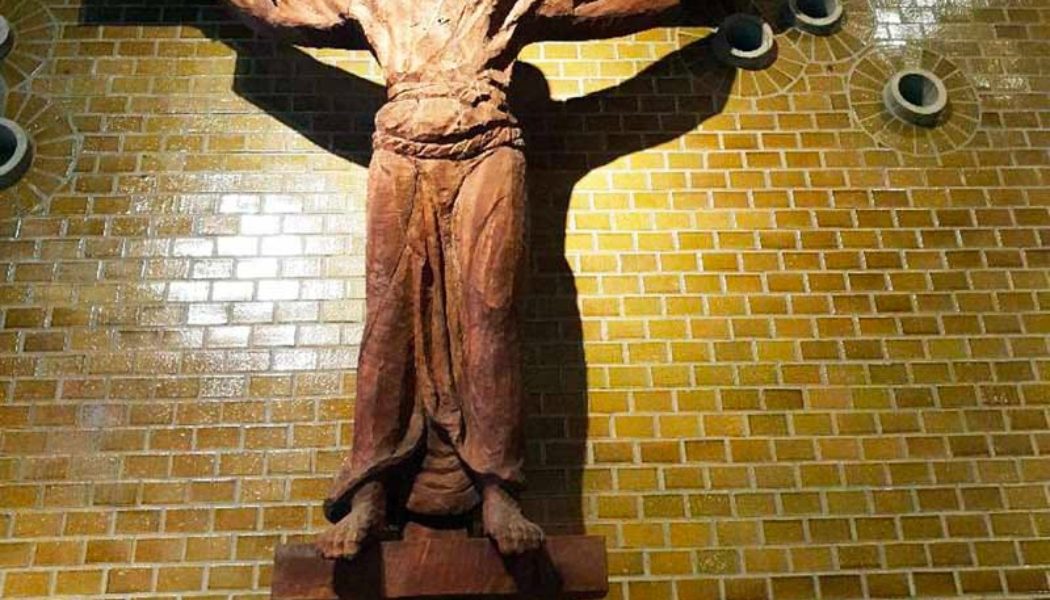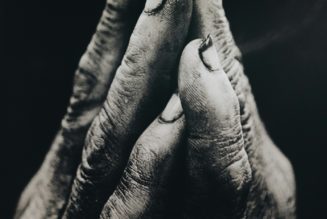Hey everybody,
Twenty years after Christianity came to Japan, Paul Miki was born in Tounucumada, Japan, the son of a military general. In Paul’s youth, more than 200,000 people converted to Christianity across Japan, churches were built, schools flourished.
Paul’s family was among those converts. He attended those schools, learned the faith, and joined the Jesuits. He wanted to be a priest.
But with Christianity growing, Japan’s emperor evenutally decided that foreign religious influence was a threat to his rule. He began to believe that Jesuits were selling Japanese people into slavery, and he was concerned that Jesuit missionaries in the country were paving the way for Spanish military forces, bent on colonizing Japan as they had colonized the Philippines.
In 1587, imperial regent Toyotomi Hideyoshi issued the Bateren Edict, which prohibited Christian missionary activity in Japan, and ordered foreign missionaries deported. The Jesuits went underground. Paul continued studying for ordination. But in the years that followed the edict, crackdowns on priests and other Christian leaders became intense.
In December 1596, Hideyoshi ordered a wave of arrests — mostly Franciscans, but also Miki, along with another Jesuit, and a catechist who was entering the Jesuits.
The arrested men, 26 in total, were declared guilty of violating the Bateren Edict, and sentenced to death. As a sign of shame, each had the lobe of his left ear cut off, and then they were sent on a forced march of some 600 miles through Japan.
As they walked through villages over a grueling month, they reportedly sang the Te deum, a hymn of praise to God.
According to the Society of Jesus, the men — Jesuits and Franciscans — were tied to crosses on a hill outside of Nagasaki, and then each prisoner was pierced in the chest with a lance.
Eyewitnesses say that as Miki hung to die, he began preaching, speaking beautifully of uniting himself to Christ on the cross, and urging onlookers to accept the Gospel. He died proclaiming Jesus Christ.
Miki and his companions were Japan’s first martyrs.
The persecution of the Church is not only a historic fact. Miki was martyred almost 430 years ago. But today clerics, missionaries, and Christian families face the prospect of martyr’s death in countries around the world. They face the choice of dying for Christ, or abandoning him.
We are their brothers and sisters. Let’s pray for persecuted Christians today. Let’s pray that they be faithful to Christ. Let’s pray that God work through them. Let’s pray also that we will be faithful to Christ — radically and selflessly faithful — without fear, complaint, or mediocrity.
St. Paul Miki and companions, pray for us.
The news
The annual Holy Week procession in the Spanish city of Seville is a big deal — for the entirety of Semana Santa, processions across the city are organized by brotherhoods and fraternities, who walk with sculptures of the Lord’s passion from parish churches to the city’s cathedral and back. Images of Seville’s Holy Week are an iconic part of Spain’s self-identity, even as religious practice in the country declines dramatically.
The controversy has become a big deal in Spain, and has begun making international headlines — especially as some supporters of the poster say that criticism is “homophobic,” while critics say it’s meant to be provocative.
For his part, the artist says he doesn’t understand what the debate is all about — but some have expressed skepticism about that.
So The Pillar talked with art critics, historians, and with local Sevillians to get a full picture of the controversy. It’s an interesting look at the limits of artistic license, especially when it comes to sacred subjects, including the Lord himself.
The idea for the healing gardens came from Joe Montanez, an L.A. Catholic — himself a victim of sexual abuse, who found comfort in gardening in the decades before he came forward with this story.
Montanez knew that many victims of clerical sexual abuse can become terrified to enter a church after their abuse, and hoped the gardens would be more accessible spaces in which other abuse survivors might feel invited to pray.
The Archdiocese of LA got on board, and four gardens have been opened since 2022, with one more in the works.
Have they made a difference? Are they being visited? What do other abuse victims think?
Read about LA’s healing gardens, right here.
This week’s Pillar Post is brought to you by the Southwest Indian Foundation’s “Catholic Pueblo Revival Paid Internship Program,” now accepting applications from college-aged men for its summer 2024 paid internship in Gallup, New Mexico.
As a missionary intern, you will help build the Saint Kateri Rosary Walk by hand, learning how to use traditional southwestern building materials and techniques. The program includes spiritual and academic formation, as well as travel opportunities while experiencing the life and history of the Catholic Southwest. Learn more at saintkaterirosarywalk.org
Readers of The Pillar know that Edgar Beltrán, our Latin American correspondent, took a trip far from Latin America last month, when he visited the Catholic Church across the Nordic nation of Finland.
During his trip, Edgar spent a weekend at Helsinki’s St. Henry’s Cathedral. For a country with a small Catholic footprint, the cathedral is surprisingly international — with a Rwandan pastor, and Mass offered regularly in 12 languages. The cathedral parish is peopled by migrants from around the world — and is preparing to initiate 40 Finnish Lutherans as Catholics this Easter.
In short, there is a lot going on at St. Henry’s Cathedral — and Edgar captured much of it.

In fact, if you want a snapshot of a cathedral with a kind of beautiful evangelical vitality, this is a very, very good one.
Do yourself a favor: Read all about the Catholics of Helsinki, right here.
The priest is the subject of a canonical investigation, and has stepped back from clerical ministry.
The pause might point to something of an emerging trend — since 2020, there have been four instances in which a bishop-elect has resigned before arriving in his new diocese.
More to the point, it has become harder for the Holy See to appoint bishops in the first place — in recent years, as many as 30% of priests asked to become bishops have said no.
To my way of thinking, both the high rate of refusal, and the incidences of withdrawing from candidacy, suggest that the Holy See has room to improve on vetting episcopal candidates before they get the nod. That might better detect whether a candidate has “skeletons in the closet” before he’s in the public spotlight.
It’s also worth asking — as I did a few years back — whether the Church needs a standard practice of psychological examination for potential episcopal candidates.
—
Finally, the Dicastery for the Doctrine of the Faith on Saturday published a lengthy note on the importance of celebrating sacraments according to the rite prescribed by the Church, and lamenting that failure to do so can lead to invalid sacraments.
The note, Gestis verbisque, did not mess around.
“Changing … the form or matter of a sacrament is always a seriously illicit act and deserves an exemplary punishment, precisely because similar arbitrary gestures are capable of producing serious damage to the faithful People of God,” it said.
“We ministers are therefore required to have the strength to overcome the temptation to feel like owners of the Church. On the contrary, we must become very receptive to a gift that precedes us: not only the gift of life or grace, but also the treasures of the sacraments that have been entrusted to us by Mother Church. They are not ours! And the faithful have the right, in turn, to receive them as the Church provides: it is in this way that their celebration corresponds to Jesus’ intention and makes the Easter event current and effective.”
The text noted that clerics might be tempted to modify sacramental rites for “sincere pastoral motivations,” like, for example, “to make them, in [the minister’s] opinion, more suitable and understandable.”
It also recognized that there sometimes exists a “training gap” among sacramental ministers — in other words, that some of them got bad seminary formation.
But the DDF didn’t let sacramental ministers off the hook. It emphasized that the responsibility of the Church is to “safeguard the substance of the sacraments,” and that “matter and form … have never depended and cannot depend on the will of a single individual or a single community.”
According to Cardinal Victor Fernández, prefect of the DDF, the document was the fruit of concern among the bishops and cardinals who are members of the dicastery, who had raised in recent years their concern that liturgical innovation was leading to invalid sacraments.
All of us likely remember the challenges caused by priests who have taken it upon themselves to attempt baptism with invalid formulas — certainly Fr. Matthew Hood remembers that, because he’s the Detroit priest who once thought he’d been ordained in 2017, and then discovered three years later that he hadn’t even been baptized. I interviewed Fr. Hood back in 2020, and — thank God — he had a pretty good sense of humor about what happened to him.
But the problem Cardinal Fernández and the DDF cited is real. It is true that clerics who are cavalier with the sacraments can actually impact people’s reception of sacramental grace.
It’s true that God is not bound by the sacraments, of course. But if we believe they’re real, and life-changing, and have eternal consequences, well, we should want the assurance of sacramental grace which comes with certainly valid sacraments. In fact, our Church depends on the validity of orders for everything, including our continuity in the gift of apostolic succession.
So, says the DDF, to paraphrase with a cliched aphorism: “say the black, do the red.”
And I’d also suggest one more thing. If you read Gestis verbisque, and it doesn’t resonate with your own parish-based experience, you might consider taking a moment to thank the Lord for that.
There are a lot of things in need of improvement in the life of the Church in the United States.
And all of us can think of liturgical horror stories we’ve heard, or experienced, about certainly invalid sacraments — my wife and I were just recalling recently the story of a certainly invalid “inventive” Mass we attended in graduate school, and our frustration that the “creative” priest stole time from us, by forcing to attend Sunday Mass again because of his invalidating shenanigans.
But for the most part, most of us can count on the experience of validly celebrated liturgy, without the persistent or even regular experience of the invalidating “creativity” which Cardinal Fernández and the DDF condemn. For that, we have parish priests to thank, and their seminary formators.
They are “stewards of the mysteries.” May they undertake their ministry with fear and trembling, at the power of almighty God in the sacraments of his Church.
On warmed nuts
Listeners to The Pillar Podcast know that I traveled this weekend to San Francisco, for a meeting, and to give a talk at the Dominican School of Philosophy and Theology, where I’m part of a cool assembly called the College of Fellows.
I fly a lot, I have airline miles and status, and every so often I get bumped up to the front of the plane, as I did on Thursday night.
So as I settled into my slightly more comfortable spot in the plane, I spent a little time thinking about the allure of first class, the reality, and why we have it to begin with.
In the first place, let me acknowledge that the first class/business class/front-of-the-plane seat is marginally better on most domestic flights than is the economy plus seat on the other side of the magical black curtain that separates them.
The TV screen is bigger, there’s more legroom, and there are a few inches more room side-to-side, which makes it a little bit easier to work.
Plus, if you sit in the front of the plane, you get free alcohol, more generous soft drink service, a mediocre hot meal, and warmed nuts.
The warmed nuts are nice. They come in this tiny little warmed finger bowl, and the warmth heats the oil inside the nuts, making them more flavorful and satisfying.
Once you eat those nuts, it would be humiliating if you had to return to eating room temperature nuts like a plebian.
But taken all together, the constellation of perks in first class hardly seems worth the thousands of dollars airplanes charge for those seats.
And yet, they sell them, at full freight, pretty often — even on short domestic flights, most first-class passengers are paying customers, not upgrade cases like me.
Look, I like it up there. But why are people paying actually 6, 8, or 10 times the baseline fare to sit in first class?
Status.
Let’s face facts.
The seat is better, but you’re still on an airplane, which means you’re still going to be fairly uncomfortable for a few hours.
The free meal you’re getting isn’t really better than the snack box you could buy in economy, and it’s definitely not better than a meal you could carry on from an airport restaurant.
You’re getting free alcohol, but even the sousiest passenger isn’t going to consume more than about $30 of booze on a flight, especially because the stewards cut you off right about when you start having a good time.
The warm nuts are an unparalleled perk, yes. But if you’re jetting from Chicago to Newark, are they worth 1500 bucks?
I don’t think so.
Instead, first class works because of our flawed cultural conditioning.
In America, prosperity is a sign of virtue. Wealth is an indicator of genius. Exclusivity is reserved to the morally superior among us. When we experience some class status, we assume that we deserve it because we did something special.
The glee is in the comparison.
But all of this is supposed to be kind of hush-hush. We all think about class, but we’re supposed to pretend we find it distasteful. We’re supposed to give winking homage to the egalitarian idea that anyone can grow up to be a deserving plutocrat.
Especially plutocrats’ children.
That’s why every American pretends he’s middle class. Social science research confirms this. Even if he took the family helicopter to school, and has never known the depressing froideur of a room-temperature legume, nearly every American will describe his upbringing as middle class. It’s a way to express a commitment to the class-free fantasy of the American ideal.
But airlines don’t play by that rule. Fork over the dough, and airlines will spend two or three hours shamelessly reminding you of your moral superiority.
While the schlubs in the back stick their coats in the overhead compartment, a flight attendant will gladly hang your jacket with care in a small closet, possibly cedar-lined.
While they get frequent reminders to wear their seatbelts, you’re allowed in the front to be the master of your own destiny, with flight attendants pretending not to notice that you’re unbuckled. If a titan of the universe wants to be sucked from the gaping hole of a popped door plug, that’s his business.
In first class, they don’t even care if you listen to the safety instructions. The presumption is that if the plane starts going down, a winged pegasus will be along shortly to ferry you towards Olympus.
And then there’s the bathroom. That’s where things get really clear.
See, first class has its own bathroom, set aside for the 12 or 16 passengers in the front of the plane. No matter how busy the lavatories in the back get, and no matter how badly some elderly economy passenger has to go, none of the Morlocks may pass the black curtain. The commode up there is reserved for your first-class ass, and it should be ready to relieve your slightest discomfort.
—
Now listen, American Airlines announced this week that it will offer some new perks in its business class seats, for its ultra-long-haul flights between Dallas and Brisbane, Australia.
On the 15-hour flights, business-class seats will soon become like little pods, with sliding doors that close, and better configurations for work and sleep.
If you’re flying 15 hours, it makes sense to get the best seat you can, especially if that means you can lie down and close your eyes on a trip traversing 16 time zones.
Still, I want to admit that the subtle psychological marketing of first class works. I would never pay for it, but, like I said, I have airline status, and I get bumped up from time to time.
And even though I’m on to the con, it works. I’d never buy a first-class ticket. I try always to buy the cheapest one. But some months ago, on a nearly nine-hour flight to Rome, I got bumped to the front of the plane. And yeah, waking up in Rome, being served breakfast, with real silverware, among the cardinals and bishops seated in first class, I’ve felt just a little bit … better, in some undefined way. And certainly better than my colleague, another Pillar editor, seated three rows behind me, but in an entirely different social sphere, in the wilds behind the black curtain.
But when you’re flying from Atlanta to Houston, you don’t need to lie down and sleep. No. You bought that first-class ticket to affirm what you really know: You’re special. You deserve a few creature comforts.
And you won’t go back to cold nuts.
—
As I mentioned last week, the Catholic special ed non-profit on whose board I serve, the FIRE Foundation, has a big fundraiser this Thursday. It’s too late to buy tickets. But if you want to support our work to help kids with disabilities go to Catholic schools, it’s not too late to bid in our silent auction. We’ve got some very cool stuff. Some of you even helped donate it.
Thanks to our new subscribers. If you’ve been meaning to become a paid subscriber to The Pillar, do it today:
If you are a paying subscriber, click here and sign up for Starting Seven. It’s a brief daily news round-up email from The Pillar, an indispensable way to get informed while you drink your morning coffee.
Please be assured of our prayers, and please pray for us. We need it.
Yours in Christ,
JD Flynn
Editor-in-chief
The Pillar
And as America mourns him, here’s Toby Keith:
This week’s Pillar Post is brought to you by the Southwest Indian Foundation’s “Catholic Pueblo Revival Paid Internship Program,” now accepting applications from college-aged men for its summer 2024 paid internship in Gallup, New Mexico.
As a missionary intern, you will help build the Saint Kateri Rosary Walk by hand, learning how to use traditional southwestern building materials and techniques. The program includes spiritual and academic formation, as well as travel opportunities while experiencing the life and history of the Catholic Southwest. Learn more at saintkaterirosarywalk.org
Comments 28
Services Marketplace – Listings, Bookings & Reviews












